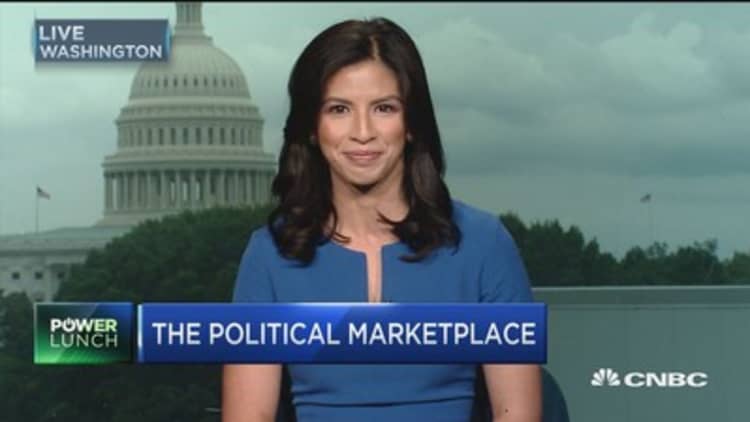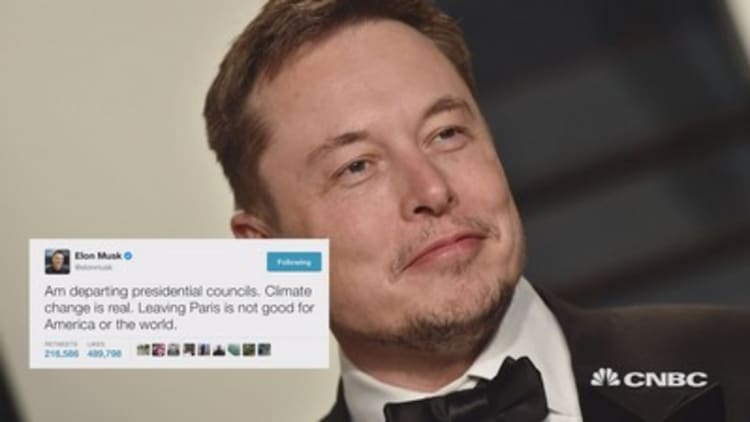
The deluge began the day after the election.
Countable had already been a popular app among the civic-minded since 2013. Its goal is to make connecting with lawmakers as simple as posting a comment on Facebook. Weighing in on legislation takes just one tap. But ever since Donald Trump's presidential victory, Countable's metrics have been off the charts.
Downloads of the app have jumped 300 percent, the company said. Sign ups have also tripled and now hover near a million. Votes on bills have doubled to more than 8 million.
"It's been bananas around here since the election," founder and Chief Executive Bart Myers said.
I always used to say this is a country that spends more money marketing a hamburger than we do for our entire political race. Today, we spend more money on politics than a hamburger.Mark Pennveteran Democratic operative
Countable is part of an emerging industry of political start-ups riding the wave of civic engagement that has spread across the country and over both sides of the aisle. There are apps for activism, data and polling firms, advertising and strategy operations — all hoping to tap into the passion of the
"I think you're seeing the marketplace explode," said Mark Penn, a veteran Democratic operative who runs a private equity fund in partnership with former Microsoft CEO Steve Ballmer. "I always used to say this is a country that spends more money marketing a hamburger than we do for our entire political race. Today, we spend more money on politics than a hamburger."
You can thank the super PACs
Politics has always been a magnet for money, but turning the machinery of a campaign into a bona fide business model is trickier. Lobbyists and consultants abound, but their work can be highly cyclical, booming in election years and tapering in between. Fortunes rise and fall depending on the party in power. And local variations in voting make it difficult to scale operations.
But those dynamics appear to be changing. The rise of super PACs — political action committees that have no legal limits on how much they can take in and spend — means more money is flowing into politics than ever. Super PACs spent $1.1 billion in 2016, according to OpenSecrets.org, dwarfing expenditures by the parties themselves. And no one is sure just how much money is being spent outside of individual elections on hot-button issues such climate change or the Keystone Pipeline.
We're at the start of this new normal, and more people are more civically engaged than they ever have been.Jeb Oryco-founder, Phone2Action
Take Patagonia, for example. The privately held outdoor outfitter recently launched a campaign to help protect Utah's Bears Ears National Monument. The company used a platform developed by
"We're at the start of this new normal, and more people are more civically engaged than they ever have been," Ory said. "I think that's something that's really going to reset expectations."
Patagonia is one of 60 new clients the start-up has signed since the first quarter of the year alone. Phone2Action's staff has doubled to 50 people since Trump was elected, and Ory said his inbox is flooded with interest from investors. The company started with seed financing of about $600,000 in 2013 and closed a $4.6 million Series A round last year.

He said many investors who are reaching out have already used his company's technology. In other words, they're becoming activists, too.
"They themselves now have taken actions on campaigns," he said. "So when they seek us out and want to talk to us, it's because they've been personally moved around issues. And that makes all the difference in the world."
Some big-name investors are already betting on the sector. CB Insights, which tracks venture capital, ranks Civis Analytics as one of the best-funded civic start-ups. The data and research firm was founded by the chief analytics officer of President Barack Obama's presidential campaigns, with seed money from Eric Schmidt, executive chairman of Alphabet. It raised $22 million in a round of Series A financing in November.
Facebook's Sean Parker partnered with Marc Benioff of Salesforce.com and others to invest $9.5 billion in Brigade, an app designed to simplify voting. Countable's backers include Gokul Rajaram, a veteran of Facebook and Google. In March, they received $2 million in seed financing led by venture capital Canaan Partners. Penn's private equity fund,
"Now we have instant communication through hundreds of millions of people through the amplification social media gives to things," Penn said. "More messages
Surviving when there's no election
To survive beyond the election cycle, the start-ups are looking to generate revenue from outside the political sphere. They're hoping corporations and nonprofits will pay for access to their services,
"We would fail if we built a business that was tied just to the election cycle," Countable's Myers said. "Our motto from the beginning

